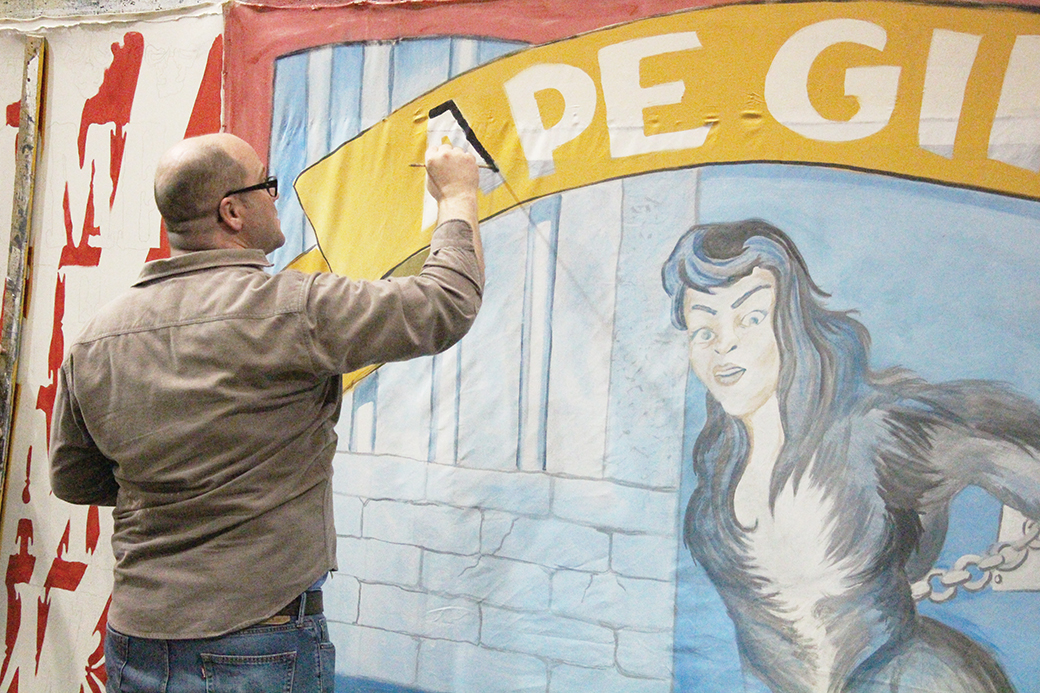
Practicums offer in-depth look at all things theater
Practicum courses are just one way theater students are able to immerse themselves in their major, but they’re often a more unique option, as they bring unexpected but welcome changes in students’ career paths.
USD’s theater majors are required to have four semesters of practicums, or a practical sections of a course.
The theater department has four specializations for undergraduate theater programs: acting, design/technology, musical theater and theater. Within these, practicums require students to not only learn other jobs associated with theater, but to further appreciate those different specializations.
Scott Mollman, associate professor and coordinator of the practicum class, said students are able to work in other fields they never would’ve considered, such as actors working back stage during productions or crew members auditioning for productions.
“(It’s to) kind of see what the other show fits like,” he said. “It gives them more exposure to the other worlds in their world.”
Mollman said because USD is a liberal arts school, the theater department wants students to gain more knowledge than they were expecting.
Practicums train students in different variations of their field. In tech practicum, for example, students have jobs ranging from set crew, light board operations, soundboard operations, microphone wrangling and others.
Wyatt Hansen, a sophomore majoring in theater with a specialization in design and tech, has completed all of his required practicums.
“They don’t let you repeat things so you’re forced to try different things,” Hansen said.
The type of practicum determines how many hours a week students are working. During shows, tech students work around four hours six days a week, but students with other commitments can also opt to work in the shops for 30 hours a week.
“We really foster an environment of asking questions,” Mollman said.
Louis Mehlhaff, first-year acting major, also expressed his appreciation for practicum classes. He’s taken two practicums so far, one working as a crew member for “Young Frankenstein.”
“It sort of forces you to try new things,” Mehlhaff said. “I never would have thought to do strike crew or be in the scene shop unless I was required to. It really gets you to figure out what else you’re good at.”
In addition to gaining appreciation for other aspects of theater, students also acquire skills that look good on a resume.
“It makes them more marketable,” Mollman said.
Hansen said gaining more understanding can help students discover a newfound love for something they may not have considered before. They did for him, anyway — he changed his specialization after completing practicum courses.
“They’ve really helped me find out what I want to do,” Hansen said. “I have gone through three of the four specializations in my short time here, and I’ve finally landed in what I believe is the right one because I’ve had the chance to be in the practicums.”
Mollman said he’s seen huge change in students when they take their practicum classes. They acquire more empathy towards their non-desired specialization, which is ultimately the goal of these courses, he added.
If he could change anything, Mollman said he’d like to see students be compensated for their hard work. Besides the most important priority, gaining experience, he’d also like to see students thoroughly enjoying their practicums by getting paid to do so.
“I’d like to have students not have to pay for experience, unfortunately they kind of have to, though,” Mollman said. “Athletes get paid to play, basically, but the theater students don’t get paid to play their sport, for lack of better term.”
Ultimately, practicum classes are ways for students to gain more experience and help them discover every facet of the theater world.
“You get a full theatrical experience, which some institutions don’t offer,” Hansen said. “We often stress that theater is a family…and so it works best when everyone understands one another and understands the difficulties of one another.”

